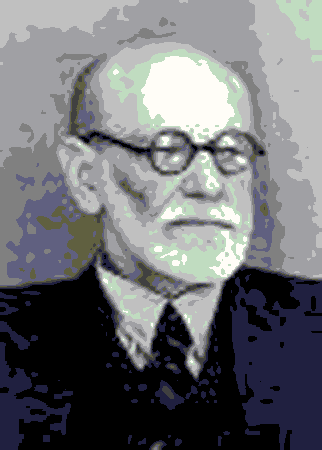
Freud, Sigmund
Sigmund Freud (1856-1939)
Freud, the founder of psychoanalysis, is regarded as a great innovater in the field of psychiatry despite the fact that much of his work has been superseded. The Interpretation of Dreams was Freud's first and most important study of the subconscious. Freud believed this work contained the most valuable of all his discoveries. Freud was born in Freiberg, Moravia, then part of the Austrian Empire. His father, Jakob, seems to have been a relatively remote and authoritarian figure, while his mother was more nurturing and emotionally available.
In 1859 the Freud family was compelled for economic reasons to move to Leipzig and then a year after to Vienna, where Freud remained until the Nazi annexation of Austria in 1937. Despite Freud's dislike of the imperial city, in part because of its citizens' frequent anti-Semitism, psychoanalysis reflected in significant ways the cultural and political context out of which it emerged. For example, Freud's sensitivity to the vulnerability of paternal authority within the psyche may well have been stimulated by the decline in power suffered by his father's generation, often liberal rationalists, in the Habsburg empire. So too his interest in the theme of the seduction of daughters was rooted in the context of Viennese attitudes toward female sexuality.
In 1873 Freud graduated from the Sperl Gymnasium and turned to medicine as a career. In 1882 he entered the General Hospital in Vienna as a clinical assistant to train with the psychiatrist Theodor Meynert. Three years later, he was appointed lecturer in neuropathology, having concluded important research on the brain's medulla. At this time he also developed an interest in the pharmaceutical benefits of cocaine, which he pursued for several years, with disastrous outcome. Not only did Freud's advocacy lead to a mortal addiction in another close friend, Ernst Fleischl von Marxow, but it also tarnished his medical reputation for a time. This episode illustrates Freud's lifelong willingness to attempt bold solutions to relieve human suffering.
In his "Project for a Scientific Psychology" (1895) Freud affirmed his intention to find a physiological basis for his theories of the psyche. In 1885 Freud left Vienna to continue his studies at the Salp�tri�re clinic in Paris, where he worked under the guidance of Jean-Martin Charcot, a strong advocate of therapeutic hypnosis. This proved a turning point in Freud's career, for Charcot's work with patients classified as "hysterics" introduced the possibility that psychological disorders might have their source in the mind rather than the brain. Charcot's demonstration of a link between hysterical symptoms, such as paralysis of a limb, and hypnotic suggestion implied the power of mental states in the etiology of disease. Although Freud was soon to abandon his faith in hypnosis, he returned to Vienna in February 1886 with the seed of his revolutionary psychological method implanted.
The most worked-out version of Freud's later theories appeared in two books in the 1920s: Jenseits des Lustprinzips (1920; Beyond the Pleasure Principle) and Das Ich und das Es (1923; The Ego and the Id). Most famous is his division of the psyche into the Id, Ego, and Superego.
In his the view of many, his master work is the one we present here, Die Traumdeutung (The Interpretation of Dreams), where Freud contends that dream play a fundamental role in the psychic economy. The mind's energy � which Freud called libido and identified principally, but not exclusively, with the sexual drive � was a malleable force capable of excessive and disturbing power. Needing to be discharged to ensure pleasure and prevent pain, it sought whatever outlet it might find. If denied the gratification provided by direct motor action, libidinal energy could seek its release through mental channels. Or, in the language of The Interpretation of Dreams, a wish can be satisfied by an imaginary wish fulfillment. All dreams, Freud claimed, even nightmares manifesting apparent anxiety, are the fulfillment of such wishes.
More precisely, dreams are the disguised expression of wish fulfillments. Like neurotic symptoms, they are the effects of compromises in the psyche between desires and prohibitions in conflict with their realization. Although sleep can relax the power of the mind's diurnal censorship of forbidden desires, such censorship, nonetheless, persists in part during nocturnal existence. Dreams, therefore, have to be decoded to be understood, and not merely because they are actually forbidden desires experienced in distorted fashion. For dreams undergo further revision in the process of being recounted to the analyst.
The Interpretation of Dreams provides a means for the unmasking of the dream's disguise, or dreamwork, as Freud called it. The manifest content of the dream, that which is remembered and reported, must be understood as veiling a latent meaning. Dreams defy logical entailment and narrative coherence, for they intermingle the residues of immediate daily experience with the deepest, often most infantile wishes. Yet Freud is convinced that with a patient analysis they can be ultimately decoded, thereby reversing their negative effect.
